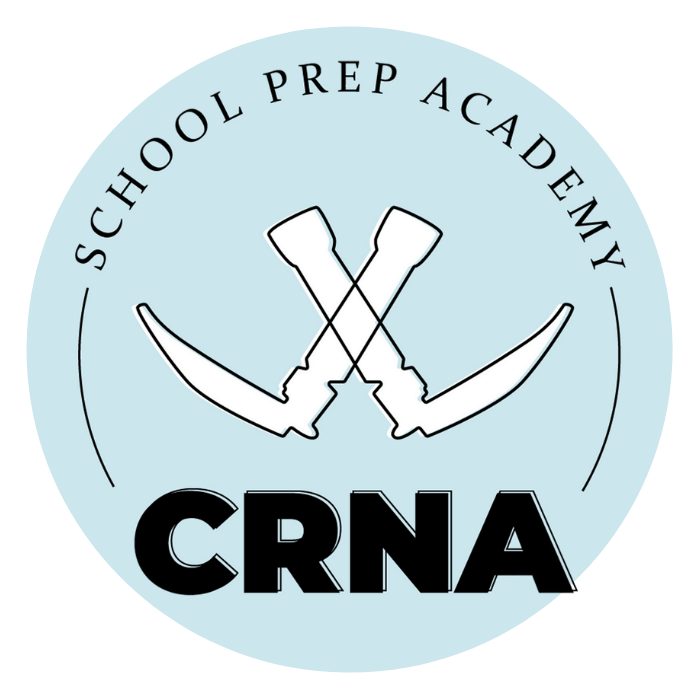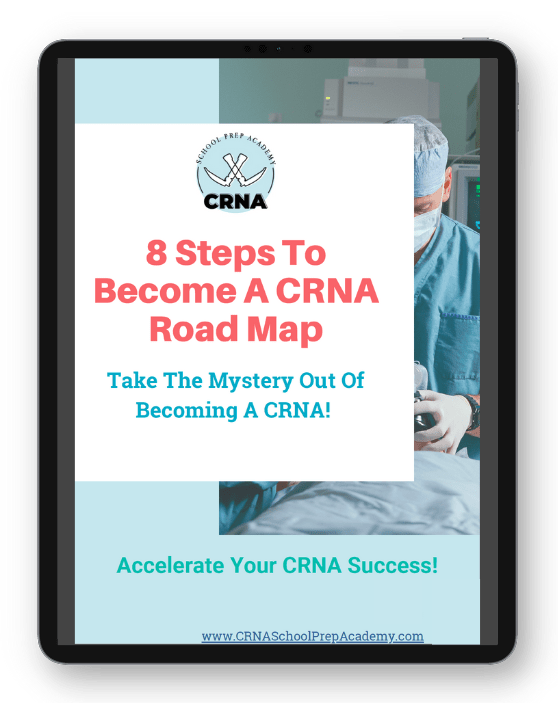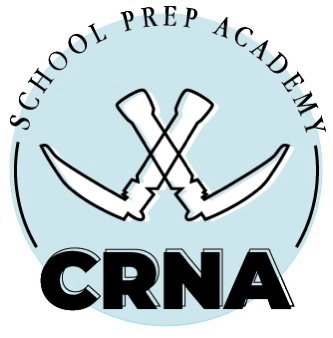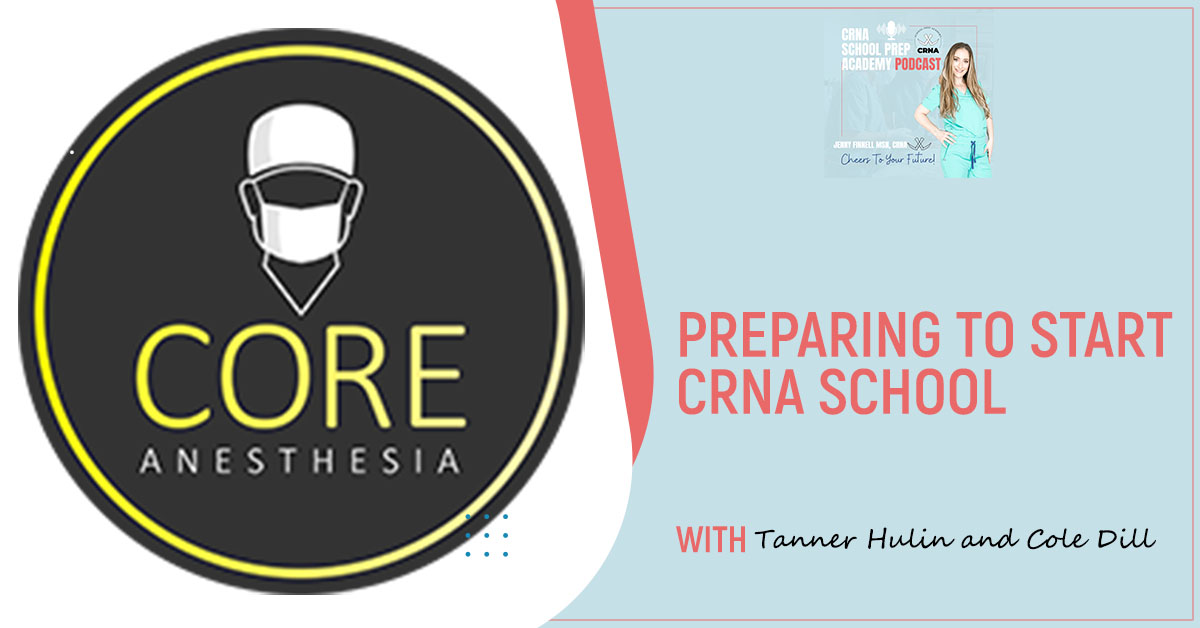
CRNA School prep can be daunting, but with the right tools and mindset, it can also be empowering. In this episode, we have Tanner Hulin and Cole Dill, founders of Core Anesthesia. They engage in a thorough discussion about the essential guidelines to follow and things to avoid when preparing for CRNA school. They cover the culture of the CRNA school itself and what students should be prepared for – both professionally and personally. Tanner and Cole also discuss their innovative platform and how it can help aspiring CRNA school students prepare for the big thing itself. Further on, they talk about the best ways to build a foundation in anatomy and physiology, develop effective study habits, and more. Tune in and learn how to get started with your CRNA journey!
Get access to planning tools, mock interviews, valuable CRNA Faculty guidance, and mapped-out courses that have been proven to accelerate your CRNA success! Become a member of CRNA School Prep Academy here! https://www.crnaschoolprepacademy.com/join
Book a mock interview, personal statement critique, resume review and more at https://www.TeachRN.com
Join the CSPA email list here! https://www.cspaedu.com/podcast-email
Send Jenny an email or make a podcast request!
Hello@CRNASchoolPrepAcademy.com
Core Anesthesia
—
Watch the episode here
Listen to the podcast here
Preparing For CRNA School
In this episode, we have two very special guests, Tanner and Cole. Welcome to the show, Tanner and Cole.
Thanks for having us.
Thanks so much for doing this. We appreciate being here and excited to chat with you.
Me, too. For those of you who are not familiar with who Tanner and Cole are, they run Core Anesthesia, which is a unique platform that I’m going to let them share. It started when they were in anesthesia school. If you guys don’t mind, go ahead and share with our audience what led you to start Core Anesthesia.
When Tanner and I were in our first year of anesthesia school, it probably took about eight months for us to realize that we were compatible in terms of being study partners. We started to call each other on our drives to campus. I had about an hour-long drive. He had about a 40-minute drive. We would talk through everything about the topic that we were studying and then we’d show up and take a test over that. We realized while we were driving that if we were able to talk through everything, then that meant that we understood it and we knew it. If there were any gaps, then we would quickly study that when we got to our campus before our exams. That went well. We were passing our tests.
We soon realized that anesthesia school is a beast compared to undergrad in terms of the level of detail that you have to be knowledgeable in. Also, the pace at which you have to learn all this content. While we knew everything well, the day of an exam, the next week, you would instantly get thrown all this new information and you’d forget half the stuff you studied. We realized there has to be an easier way to remember this. We decided, “Why don’t we freeze time when our brains know something the best on the day of an exam? That way, three years down the road, when we get to boards, we can re-listen to all these talks that we do and be able to help ourselves study for boards or even finals along through school.”
We started doing that. Long story short, our classmates heard about the recordings. They wanted and loved them. They encouraged us to start a podcast. Back then, we started what was called The Student Nurse Anesthesia Podcast. Pretty much, it’s a half-hour to 45-minute episode diving into all the information that we thought you would need to know before taking an exam on that topic. It continued to grow and we were blessed to see how many students fell in love with it. Now, we have a little over three-quarters of the anesthesia students in America using us. It’s been amazing to see how much it’s grown to the point now that we rebranded it to Core Anesthesia.
Now we offer all of our content for the full curriculum for students, but then also CRNAs can use our content to earn their continuing education credits and their CE renewals once students graduate and become CRNAs. It’s been an interesting journey. We never thought it would’ve grown to what it is. It’s been cool to see it grow and we’re so excited that we’re able to provide the education side of things and a way for students to be able to learn on the go. If you’re not in school yet, you’re going to soon realize you don’t have a lot of time in school. Any way that you can maximize your time, whether you’re driving, working out, cooking, etc., we feel like the audio-based format that we provide has been very helpful for people.
CRNA School Prep Recommendations
I love to bring on what we are talking about with you guys. We’re going to talk about how to best prepare prior to starting the CRNA school. I truly believe that Core Anesthesia could be a great way. As Cole said, you can plug it in as you’re cooking dinner. It’s something about the ease of audio, being able to plug into your ear and take it wherever you go. Whether that’s a car ride or whether you’re folding socks or trying to find socks that are more likely in your laundry basket, you can listen to things and help yourself. Thank you so much for sharing that humble beginning and sharing that this was a passion project. This was something you did that you knew was going to help both you and Tanner.
Through your classmates saying, “We want this too.” You guys were like, “Let’s help.” This came from a place of being very genuine, wanting to help and give back. That’s what you guys stand for. Essentially, you’ve been mentors to, as you said, a good chunk of our anesthesia community. I’m excited to see where you guys take this, but we’re going to break down how Core Anesthesia can help prior to you starting your program. Let’s go ahead and dive into that.
You nailed it on the head when you were talking about having the ability to learn wherever. I would assume some portions of the audience are like me. It’s difficult to find time in the day to sit down and carve out time to either run through modules or sit and read a book, especially as you’re preparing for school. You’ve got a full-time job, most likely, or other commitments on your time. Those things are not like what it looks like to be in CRNA school when you’ve got full-time clinical commitments and didactic work. Where I think Core is helpful, at least it was for me, is it wasn’t something where for the first time I could sit down and listen to an episode.
Maybe I would have that locked in from start to finish and understand all the concepts, but it’s something that passively, you can start listening to. Say you’re trying to brush up on vasopressors and you’re like, “I can’t exactly remember if Phenylephrine is alpha, beta, or what all that looks like.” You can be on a run, going to the grocery store, folding those socks, or whatever you’re doing and you’re passively listening to this content. That’s where it could be helpful for people that are still looking to get into school. If you’re already in school, maximize the time and find little spots in the day when you’re able to passively do this learning and listen to these episodes. That’s a perfect way to use it.
What To Study Before Starting CRNA School
We’re going to get into a little bit here of what we would recommend for people to study, the do’s and don’ts, and how you can prepare yourself for school. You’ll see a lot of that fits into this type of learning. Find ways that you can maximize your time because again, you think you have no time before school and it’s probably true. It looks different when you’re in school and I guarantee you feel like you have no time when you’re in school. You need to find ways that you could be creative and still maximize your study time.
That’s a great way to put it. It’s key when you’re studying too. I’m curious to see what you guys think about study techniques. I think it’s about maximizing and optimizing the best strategies in multiple different ways. Audio is one of those ways. I was a big fan of writing notes down. For whatever reason, when I would write something down, it would stick but it wasn’t the most efficient way. Similarly, I would love to highlight things in different colors.
That was more efficient but it wasn’t always as effective for understanding. It was good for memorization. I could recall what was in blue and what was in pink, but it wasn’t creating that understanding. There are different aspects when it comes to studying between understanding and memorization. I’m curious to see what your guys’ thoughts are as far as breaking down those study techniques.
I’ll hop in quickly, Cole, before you jump in because this is your bread and butter. I’ll say that this is something that I had to completely change. This is something that Cole helped me with. If you’re tuning in and you’re not in CRNA school, the way that I studied in undergrad looks night and day from how I had to learn to study in CRNA school. Cole is going to talk about a little bit of what that looks like, but I’ll identify with you the way that I had to study changed. I was very memorization-based and hit all the details. It had to look a lot different when I got into CRNA school.
We should preface too before we jump into this that there’s no one way fit all for everybody. Everybody has their own style that works best for them and you need to find that. The stuff that we’re going to talk about here in the next few minutes is something that after talking to lots of students across the nation, this is what seems to work the best. Again, if this doesn’t work for you, you don’t have to do it this way. This is something that I feel is going to help when you get into school in terms of how to successfully maximize your study techniques then also how you do better on the test or on the exams. It’s not just understanding information, but it’s how you apply it in a test-taking situation.
Before we jump in, if you’re somebody who hasn’t gotten into school yet or you’re looking at getting in, we’ve had a lot of great feedback from ICU nurses who’ve said that they’ve listened to our content. It’s helped them when they get into their interview portions in terms of understanding some of those critical thinking questions that they may be asked.
If it’s something that you’re interested in, feel free to check out our app Core Anesthesia because we walk through everything in the anesthesia curriculum. You can choose what topics you want to go over that you think you might be asked in your interviews. If you’ve gotten accepted and you’re ready to start prepping yourself for those study habits, that’s what we want to focus on.
CRNA School Do’s And Don’ts
We want to talk about both do’s and don’ts. When you get into school, there are things that you should not do and there are things that you should do. To start, we’re going to talk about the don’ts. The first thing is, as Tanner already mentioned, don’t try to memorize every detail. I talked about earlier how it’s not so much that anesthesia school is a totally different level of conceptual information compared to undergrad.
It’s still the same basic body systems. The difference is you’re having to know it in more detail, being tested in more detail, and then you run through it so much quicker than undergrad. Partly because you’ve already had it in undergrad so you’re reviewing but you’re taking it a step further. If you try to memorize every detail, you’re not going to. I tried and Tanner tried and we realized it doesn’t work. You can’t hold that much information in your brain to the level of detail that you want to hold it. You can’t try to memorize every detail.
The other don’t is don’t consistently spend long hours or nights studying. The marathon of school requires you to find a balance and rest. We have a couple of podcast episodes on this regarding how you find that balance through school. How do you find the amount of study time that you need versus don’t need? I had young children in school. I had a six-month-old when I started and then I had a second one, six months before I graduated. I had to figure out how do I balance myself to study appropriately but also spend time with family because I’m a big family person and I didn’t want to sacrifice that for school.
Don't consistently spend long hours or nights studying the marathon of school, which requires you to find balance and rest. Click To TweetEven though going through school is my priority, I needed to get through it. I also didn’t want to sacrifice the rest. During the first eight months of school, I messed up horribly. You have a lot of actual time at home. At least our program did. In a lot of our classes, you’d go in either hate the class in person or you’d have it online. If you weren’t in clinical yet, we had a lot of time studying at home. I made the mistake of trying to study while around my family members.
I’d be watching a show with my wife at night after the kids went to bed and I’d have my computer out trying to study or I’d have toys with the kids and I’d be playing dinosaurs with my son and I’d be trying to study. It doesn’t work because, at least for a guy, I can’t multitask. Maybe, some people are better at multitasking but you have to be actively engaged in your studying.
What I found after eight months, it did me so much better if I would leave the house or go into a quiet spot in the house and set aside a two-hour stretch where I would put my phone away and crank out active studying. I would put it all away and enjoy 100% family time. If you try to do two at the same time, you’re going to fail at both. That’s a second don’t. We’re going to go into that a little bit more as we move forward.
Another don’t I want to talk about is this. I already mentioned this a little bit, but don’t mix your studying with your leisure time. The reason is you have to be active in it. Tanner talked a lot about this going through school as he and his wife always watched Netflix shows and he would pull up studying while doing Netflix. He’ll allude to this in a little bit about how it didn’t work. He ended up having to spend three times as much time studying than if he would’ve gone away. He found that time and came back. We’ll talk about it when we get to the do’s, what we would recommend doing for that, and how you find that right balance.

These are all great tips. I love the fact that you said you have to be one or the other. You can’t do both. You’re 100% family or 100% studying. That’s true because when you’re building your brain, it takes a lot of effort both emotionally, physically, and mentally. You cannot truly be engaged if you’re also trying to engage with your loved ones or some personal time. One thing I do think that’s good about you guys do audio. I love learning. I listen to tons of books on audio but I do that usually while I cook. If you’re good at cooking or you don’t have to read recipes, I should say I have messed up recipes by trying to listen and cook at the same time.
You can find different activities like going to the gym or driving a car so that you can accomplish both things at once. There are certain things and it’s usually person-to-person interaction that you cannot achieve both like what I do. I listen and I cook dinner, but as soon as I’m done cooking dinner and I sit down with my husband, those earbuds go off. I can’t engage with my significant other while I’m also listening to a book. That’s where Cole was mentioning you have to draw the line.
I would agree with what you said about being present with someone because that’s a huge challenge in CRNA school. The amount of time that you’re in the hospital and you’re in classes and then you’re trying to study on top of that, it takes a toll not only on you but on those relationships that you’ve formed before anesthesia school. We have an episode about that. We brought our spouses on and we did an episode of CRNA school from the spouse’s perspective.
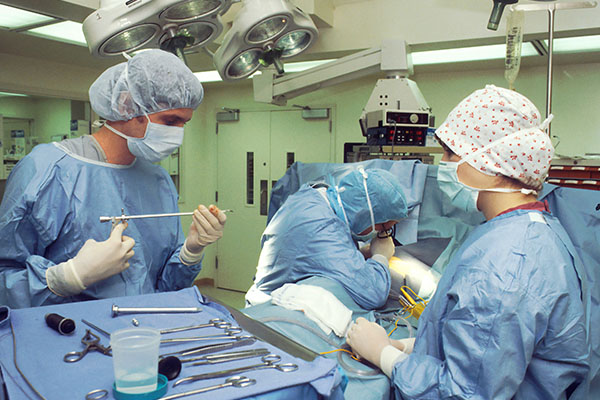
That’s fun. Do you know what the episode is? I want to listen to that.
I can pull it up. We wanted them to talk candidly about what was this like for you. What was it like to have us constantly always have that sidetrack spot in your mind where you’re always thinking about your next case or if you’ve got a certain preceptor you’re going to be with? There are 1 million things that are milling around in your brain. For me, especially, I had to set barriers and boundaries like, “This is where I’m going to go study school. This is where I’m going to spend time with school and then here’s where I’m going to spend time with family or doing other things.”
As you mentioned, the beauty of audio was that you could pair it with driving, working out, or going to the grocery store. With things that are less meaningful, you were able to incorporate that and maximize those times. That’s the name of the game. Try to figure out what you can do that makes it efficient, but then also set up those boundaries so that you have the ability to devote your time equally to people and also to school.
By the way, I looked up that episode. That’s episode 64 is our Real Talk episode on Anesthesia School from a Spouse’s Perspective.
You guys check that out. Episode 64 on Core Anesthesia from a Spouse’s Perspective. Honestly, it would be good to give it to your significant others to take a listen to it themselves. I’m speaking for my husband here, but it was lonely for him too. My husband’s biggest struggle he told me was he felt bad for me when I come home in tears or when I cry and drink wine in the shower or whatever it was.
He’d want to talk to me and I didn’t want to talk. It was so emotional for me to even try to talk about it and I knew he wouldn’t understand. That was hard for him to watch me suffer and suffer alone and feel he couldn’t help. It can be hard on your significant other too. I’m curious to listen to that episode as well. Thank you for sharing.
As we talk about this, we’re gearing this talk to hopefully be helpful to you if you’re in CRNA school or if you’re accepted, but then also if you’re still preparing to either apply for school or you’re in that stage of the process. With all of this, these are things that are helpful to hear even before you get into school. It’s helpful to hear that it is tough for the family.
Those are things that you can gradually start to work towards as you’re starting to prepare yourself for CRNA school and you’re trying to study for interviews or if you’re trying to retake some classes to give yourself a better chance with certain requirements. Start using these as practice steps of setting boundaries and giving yourself time to devote yourself to studying your school.
There’s a lot to work on both professionally and personally as you go through CRNA school. We think always that we should prepare ourselves professionally, but there are a lot of things too that would be helpful personally to start getting into the rhythm of those things before you get into school. The other thing I wanted to mention, getting back to these things that we wanted to touch on with what you shouldn’t do.
I know we’re starting with the negative, but when you’re trying to study, one of the things that I tended to do was compare myself with my classmates. Maybe this is something that you’re doing with other people that you know are applying. You can play the comparison game all day long and at the end of the day, you know what works for you.
As Jenny said, you like to highlight and write things down. For me, I liked flashcards, reading, and taking questions. Those were the things that were helpful for me. You can start looking at what other people are doing and you can get nervous that, “I only spent two hours studying for this topic.” Maybe it’s cardiac or someone doesn’t cardiac and you like cardiac. They spent twelve hours studying and you can start thinking, “I’m not prepared or I didn’t spend as much time.” This comparison thing can eat into clinicals, study habits, and all those things. Learn to find what works for you and stick with it. That’ll serve you very well as you prepare for school.
Just learn to find what works for you, and stick with it. That'll serve you very well as you prepare for school. Click To TweetThe other thing I would say, and this is the last thing that we’ll say before we get into what you should do is don’t try to use every resource. We’re saying this as somebody who’s offering a resource but if audio doesn’t work for you, don’t use audio, or don’t use us. Find what works for you because you almost get FOMO of like, “They use this app and that seems to work for them so I should download that. They use this book and it works for them. I should use that book.” Now you’re diluting your study time into all these different things where if there was one book, one app, one person that when they explained it made sense for you, stick with that.
It doesn’t mean that you need to use everything. At least for me getting into school, the first week they were like, “You need this app, book, stethoscope, shoes, and scrub pants.” I was like, “Oh, my goodness.” I’m out there buying everything and pretty soon, there are so many things that I don’t use. There are still things that I never used that I purchased in that early time. Find what works for you and don’t try to do it all. Don’t dilute your study time. That’ll serve you well.
I love how you mentioned comparing yourself. I’m going to read this quote that I love about comparing yourself to others. “Constantly comparing yourself to others will only magnify your insecurities and distract you from reaching your full potential. The only one you should compete against is your former self,” meaning who are you yesterday then who are you today? That’s who you compete with. I see it all the time where students compare themselves to their coworkers. They get this tunnel vision, they neglect themselves, and they focus on what other people are doing. They don’t help themselves.
That is a great takeaway and thank you for pointing that out. There’s something called resource overload. I 100% agree that you have to find what works for you. Just because someone loves a certain resource doesn’t mean you’re going to love that resource. Find what works for you. It’s okay to be different. It’s okay to stick with one thing that you feel like you can jive with. Doing more is not always better. It’s more about being focused on what is moving you forward with what you are trying to accomplish.
It was the last semester of our first year. We did an episode on this later but I spiraled into a pretty bad depression anxiety spell. I’ve never ever struggled with depression anxiety. I’m always a glass-half-full guy. I was crushing the first eight months of school. I was feeling great about it. We got into our third semester and our instructor gave us probably six different textbooks and said, “For this Core Anesthesia class, you need to read this chapter out of this book, this chapter, and this chapter.” It was the day after we found out we were pregnant with our second child. This is something I do not recommend.
I was working part-time in the ICU still. It’s doable, but it burnt me out. Instantly, in a 48-hour period, I spiraled into this anxiety spell, which ended up being a six-month process to get out of this. We did an episode all about mental health through school. It was something that I elaborated on then. Part of the reason was that I didn’t focus on what worked for me.
I saw that I have all these resources that I’m supposed to be looking at. You don’t have to look at all these different resources. Find what works best for you. I wouldn’t say necessarily one. Probably at least have 2 or 3 different things that you can group together, but you don’t need to dilute yourself. Every resource available doesn’t mean you have to utilize it. Find what works for you.
That bridges us now into the dos. After going through school ourselves and then after talking to a lot of people, what are things that we would recommend that you do both in preparing for when you start school, but then also when you get into school and you’re going through the thick of it? What are things that you can do to maximize your study time?
The first thing and this is probably the biggest thing, is to seek to understand concepts, not facts. We are big proponents of this because as we mentioned, there’s so much information. You are never going to remember it. To this day, while working as an anesthetist, I don’t remember a plethora of facts that I learned in school. I have not looked at a PKA value of a certain local anesthetic. It’s so long. I haven’t looked at the protein binding of a thing. You need to know it for boards. You need to know it for your test going through school.
You have to prioritize what are things that you’re going to want to know in your practice and understand versus what are the things that you’re going to have to memorize and you know it’s going to be left when you move on. Let’s face it. We live in a world now where we have technology at our fingertips and where we’re able to look something up. If we need that certain fact, I’m able to look it up in my job. However, I want to know going through school when I graduate, do I understand the principles to safely take care of my patients when an event comes up, how do I critically think, etc.?
You have to understand the concepts. What Tanner and I did is when we would study with each other, we would have a conversation. We wouldn’t just read facts. We would study on our own first, but then we would come together. I like to call it active studying, not passive studying. We would have a conversation and ask each other questions or we would teach and explain the conversation or the topic to each other, which is why the podcast itself helped us in our studying. If I was able to teach our podcast episode about that topic, I knew right then and there if I was ready to take my exam on that topic and if I understood it.
An example of what I’m talking about here is let’s say, a low ejection fraction. How is that going to affect my induction dosing of medicine that I’m going to give to put a patient to sleep? You can memorize certain facts, but you need to know if you have a patient with a low ejection fraction, I’m not going to want to give the same amount of induction dosing that I’m going to give a patient that’s healthier because it’s going to have X, Y, and Z effects. Knowing that, what other medicines or medications would I use to help that patient through?
You need to start thinking about why those things make sense rather than simply, “I have an EF of 45% compared to 70%. I’m going to want to reduce my propofol to these milligrams per kilogram.” That would be simply memorizing. There are too many of those facts. Do you understand why would a low EF affect my induction dosing? That’s why when you study as a group, which we’ll get into here shortly, finding study partners to talk through the material is key.
Tanner and I had two other people in our class. There was a group of four of us that would study together. There were things that each person would remember or draw out that maybe I didn’t necessarily think of when I first studied the material. Using a group to explain, teach each other, and help each other goes a very long way.
Having those conversations such as, “If you do have a patient with a low EF, why would I want to do this?” Having to explain it means that you understand it. It’s very important that you find at least 1, if not 2 or 3 other people that have the same study habits or techniques as you, that you can group together with. Not to isolate yourself from the rest of your classmates, but it is important to have a core group that you’re going to be able to maximize your study time.
It is important to have a core group that you're going to be able to maximize your study time with. Click To TweetStudy Tips For CRNA School
One more I want to talk about before we move on is to devote uninterrupted time to studying. I already alluded to this with the don’ts. However, when you study, put away your phone for a couple of minutes, put it on silent, turn off the TV, and get away from your family for a few minutes. This is something that I can tell you from experience. I did it wrong in the first year of school. Once I corrected that, I found that I had more time with my family, more time on my phone, and more time to watch TV than when I sat there trying to do both at once. It’s very important that you set aside everything, crank it out, and then you can go on it. It is not that much studying time when you do that. It doesn’t take ten hours a day.
Some people in our class took more than ten hours a day studying because they did it passively while they were trying to do other things. If you know what works for you, you set aside the time and you crank it out, you’re then able to put away your schoolwork, find balance, and spend time with family. Every Sunday, I was with family if we had tests Mondays on during our last year of school. Once the kids went to bed, I had to then re-get my studying tools out and go through the content.
I would try to maximize things during the week so that I could have a full day every weekend completely off. Again, this isn’t 100%. It changes when things come up. Finding that balance was key for me. A lot of people that I’ve talked to, you have to find that balance. Otherwise, you get way too burnt out. If you can devote uninterrupted time to studying, then you can devote uninterrupted time to the things that you’re passionate about.
It’s great advice.
One practical takeaway if you’re getting ready for school, say you’re working in the ICU. When we talk about understanding concepts, I would much rather you don’t remember specific names of pressors or certain drugs, but if you understood the concept of why you would pick one or the other, if you have a septic patient, why you would choose one vasopressor over another, understanding how alpha and beta are going to affect a patient’s blood pressure, understanding why is vaso different from using phenylephrine or norepinephrine?
I would care less about the actual names and the specific memorization facts but having those concepts of understanding like, “Here’s the bigger picture of why we’re trying to do this.” It’s not that they’re sick and they have low blood pressure, so we do something to fix it. Why is this one going to be better? If this is a cardiac patient, are we concerned about increasing the pump? Are we going to be increasing after the load?
There’s a lot of understanding behind the picture that for me, I didn’t take time to always look into those details. Low blood pressure, fix it. I can use these tools, and move on. As you start to think that way as an ICU nurse in understanding the why behind what you’re doing, that’s going to serve you super well when you’re looking to study and understand those concepts. You can always spend time memorizing and connecting the names that you’re understanding, but far and away the concepts compared to the actual memorization. I would say holds its weight.

Thank you, guys. This is all great advice. I feel like you guys touched on a lot of practical things that our audience can start implementing now no matter where you are in your CRNA journey. I love that Tanner mentioned starting from the time you’re in the ICU because you have to think through the why and play this inner relationship game between drugs and pathophysiology fluid shift and hemodynamic monitoring. They all tie together. When you can try to think of it as a big giant puzzle, and these puzzle pieces fit together in a way, how can I make them fit together? How can I understand them all?
That heart failure is not just heart failure. This person is on a certain drug calcium channel blocker. Why is that? How does that affect his pump? How does it affect his blood pressure and why does he need it? What are some things that we have to watch out for because of his pathophysiology and because he’s on certain medications? Maybe it’s a ditch. There are always multi balls in the air when you’re considering a patient and each one can fall in different ways. Your goal is to understand how to keep those balls and juggle.
How to create a steady flow state for your patient who has multiple comorbidities and is now also undergoing potentially a big bloodletting surgery or a surgery that’s going to potentially affect his hemodynamics or his respiratory status afterwards. How can you optimize that patient so he has the best outcome? Thank you, guys. This was great. How can people connect with you guys? Obviously, Core Anesthesia. If you want to find the app, I highly encourage you to go look at the app now. They also have a podcast that I highly encourage you to check out. You guys are on all major platforms, correct?
You can find us on any of the platforms. Our app is our podcast that we brought into an app format. The reason we did that is because we have all the resources there. If you’re a CRNA, we offer CEUs that you could earn there. We offer some core modules as well. We have a lot of PDFs and questions that you can take and those types of things on our app. If you want to listen to episodes, find us on Apple Podcasts, Spotify, or wherever you usually listen to your podcast.
We’re available there. If you want to check out more of our content, our apps are the best place to go. You can download that from the Google Play Store or on the App Store. We’re so grateful that you had us on. We’re excited to talk about this stuff. We’re passionate about it and it would’ve been helpful for me to have through some of these things before I jumped into school. I’m hopeful that your audience find it helpful as well.
I’m sure they will. Thank you, Cole, too. The content that Core Anesthesia offers, you guys think about it, they utilize this as they were going through school. The content that they present now is equally going to be helpful for you as you’re preparing to start your program and interview, even as you prepare to take your boards. Keep your CE credits current as a CRNA, which I’m going to ask you more questions offline about that because I need help with that. Thank you, Cole. Thank you, Tanner. It was a pleasure to have you.
Thanks for having us.
Important Links
- Core Anesthesia
- Anesthesia School from a Spouse’s Perspective – Core Anesthesia’s Past Episode
- Core Anesthesia App
- Apple Podcasts – Core Anesthesia
- Spotify – Core Anesthesia
Get access to planning tools, mock interviews, valuable CRNA Faculty guidance, and mapped-out courses that have been proven to accelerate your CRNA success! Become a member of CRNA School Prep Academy: https://www.crnaschoolprepacademy.com/join
Book a mock interview, personal statement critique, resume review and more at https://www.TeachRN.com
Join the CSPA email list: https://www.cspaedu.com/podcast-email
Send Jenny an email or make a podcast request!
